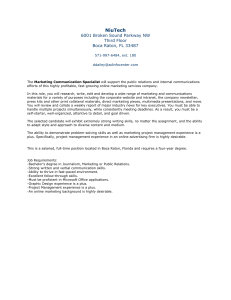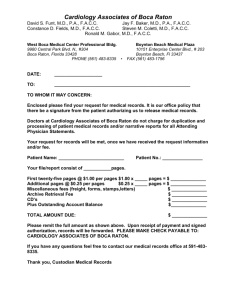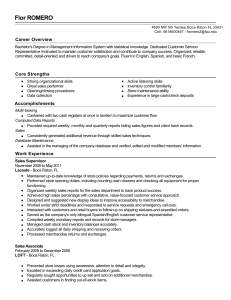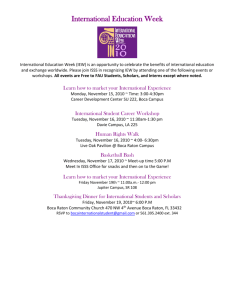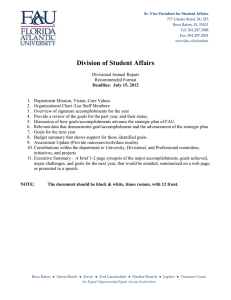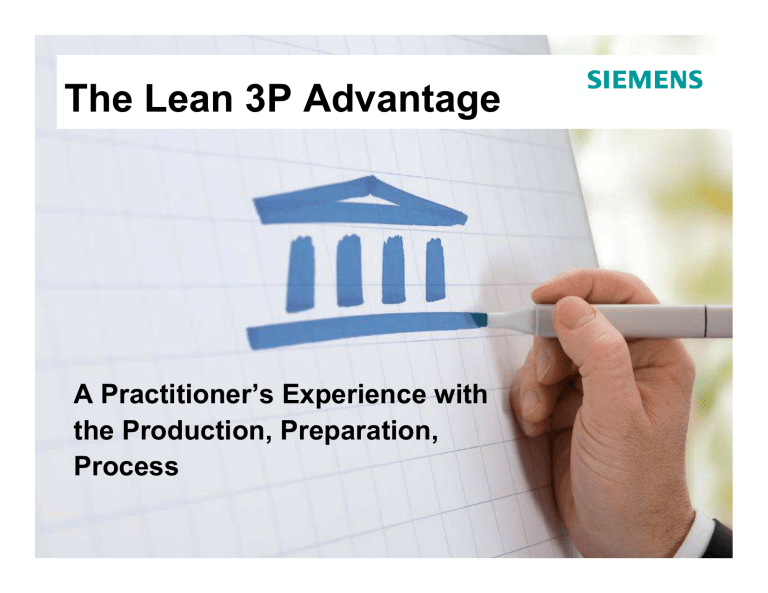
The Lean 3P Advantage A Practitioner’s Experience with the Production, Preparation, Process For internal use only Life Before 3P This is a story of a process that helps us avoid bad designs, takes us past average designs and to the place where good designs can become GREAT We all recognize faulty design… Tacoma Narrows Bridge Why apply 3P? Production, Preparation, Process An event-driven process for developing a new product concurrently with the operation (process) that will produce it, by the people who will interact with it. Breakthrough Results Lowest Initial Capital Costs Lowest Ongoing Cost Basis Where did 3P come from? Lean 3P is a systematic process for innovation in design based on Toyota’s Set Based Concurrent Engineering methodology. 3P was developed by Mr. Chihiro Nakao, a former Senior Manager at Toyota and founder of Shingijutsu 3P enables development of GREAT products The Right Features The Right Price Point The Lowest Manufacturing Cost The Highest Customer Satisfaction “Good is the Enemy of Great” - Jim Collins More and more companies are adopting Lean 3P Two Examples General Electric 2012 Superbowl Commercial - GE Appliance Park, Lexington, KY and now . . . the rest of the story . . . Danaher An umbrella corporation encompassing many successful companies including: Beckman Coulter, Molecular Devices, Fluke, Dexis, Dover, Eagle-Signal, Qualitrol, Tektronix, Arbor Networks . . . “The general rule of thumb for leadership is that with 3P, you can normally get a given increment of capacity at one-quarter the capital cost of traditional approaches, and you can normally get a fourfold productivity gain” * - George Koenigsaecker Former President of Danaher and Developer of the Danaher Business System * Koenigsaecker, George. Leading the Lean Enterprise Transformation. Boca Raton: CRC, 2009. What about other companies who make GREAT products, but don’t use 3P? “We wanted to get rid of anything other than what was absolutely essential. To do so required total collaboration between the designers, the product developers, the engineers, and the manufacturing team. We kept going back to the beginning, again and again. Do we need that part? Can we get it to perform the function of the other four parts?” - Steve Jobs “Much of the design process is a conversation, a back-and-forth as we walk around the tables and play with the models. He doesn’t like to read complex drawings. He wants to see and feel a model. He’s right. I get surprised when we make a model and then realize it’s rubbish, even though based on the CAD renderings it looked great.” - Jony Ive * Isaacson, Walter. Steve Jobs. NY NY: Simon & Schuster, 2011. Sr. VP of Industrial Design, Apple Where is 3P applied? • Designing a new product • Increasing Plant capacity to meet customer demand • Relocating factory operations • During process quality improvement efforts • Purchase of capital equipment New Products AME 3P WORKSHOP Squeeze machine redesign at Therafin Corporation June 2012 – Chicago, IL Evaluating Alternatives Natural Alternatives Prototype Refinement Final Concept Plant Layouts Alternatives Criteria Defined Scale Model Prototypes New Operations Combined Prototype Completed Operation The Problem With Typical Product & Process Development Typical Product Development Approach Concept Design • Over the Wall Production Engineering • Late to Market Production • Rework pre-launch and post-launch • High development costs * Used with permission: Coletta, Allan. The Lean 3P Advantage. Boca Raton: CRC, 2012 The Shape of Reliable Innovation is . . . Iterative . . . Generate Product Concept Not Sequential Concept Generation Product Planning Repeat Expose Customer to Product Conversation with Customer About Product Product Engineering Process Engineering Production Process Product * Used with permission: Coletta, Allan. The Lean 3P Advantage. Boca Raton: CRC, 2012 Why does 3P work? • Intense cross-functional collaboration • Product Development concurrently with Process • Rapid learning and Try-storming • A process that moves quickly through a series of steps that activate our thinking and help us gain understanding as we evaluate and converge upon optimum solutions. Lean 3P Event Flow Ideas Bold Goals Production Process Planning Try-Storming Product Planning Product Converge Try-Storming Designs & More Prototyping Refine Designs & Develop Project Plans Final Designs Voice-ofCustomer Research Data Information Innovation Prototyping & Redesign Optimization Knowledge Gathering Develop Alternatives Prototyping & Convergence Evaluation & Detailed Planning * Used with permission: Coletta, Allan. The Lean 3P Advantage. Boca Raton: CRC, 2012 The Lean 3P Process Who needs to be included? Collaboration during development of both the product and the process Sources of Cross-functional Input Research & Development Quality Assurance Process Engineering Design Engineering Health, Safety, Environmental Supply Chain / Logistics Material Handling Finance Maintenance Equipment Vendors Production Operators Customers Sales / Marketing Raw Material Suppliers Regulatory / Compliance External Experts Operations Management Technical * Used with permission: Coletta, Allan. The Lean 3P Advantage. Boca Raton: CRC, 2012 Goals and Boundaries Process Name The 3P Event Charter Start Date End Date May 5, 2014 May 9, 2014 The No-Diesel Diesel Engine Project Process Boundaries Start Time End Time 7:30 AM 4:30 PM New product to utilize alternate hydrocarbons in a diesel-style engine. Event Meeting Location Factory and shop only. Not receiving, South Factory warehousing of distribution. Process Owners VP Operations - Ron M VP Marketing - Hal M Why Do We Need This Event? Process Experts Existing product lines plateau. Cost of Product Mgr - John W, Design Engr oil is skyrocketing. Hybrids and electric Kay M, Regulatory Mgr - Stan G, causing market erosion at 5% per year. Director HSE - Jim E, Director Operations - Alex K, Supply Chain Paula E, Production Super - Joyce W, Technical Mgr - Kim G, Procurement George M, Quality Supr - Narda M, Finance - Pam M, Operators - Megan B and Alexandra C, Facilities - Glenn S Event Targets Event Judges Chief Engr - Ron M, Research - Maria Final product cost under $1,500 USD at S, COO - Ken R, Dir. Lean Sigma rate of 30,000 units per year. Drew L Process Outsiders Capital cost limited to $1.2 MM USD. Time to market launch 14 months or less Acme Machine Tool Co - Andrew J Facilitators The Sensei Co. - Kit E MEP - Kim K * Used with permission: Coletta, Allan. The Lean 3P Advantage. Boca Raton: CRC, 2012 Choosing Design Criteria Evaluation Criteria Select strong Design Evaluation Criteria These Design Criterion will be used to evaluate all alternatives and prototypes during the event 1 2 3 4 5 6 7 8 9 10 11 12 13 14 15 16 17 18 19 20 21 22 23 24 25 26 27 28 29 30 MUST SHOULD COULD Takt Time One-Piece Flow Pull System People Involvement Automatic Unloading Load-Load Operations Low Cost Automation Mistake-Proof (Poka Yoke) Minimal Capital Minimal Space Required Low Motion Waste 100% Gauging Maximum Operator Value-Add Changeover Time Tool Room Maintenance Tooling Quality or Tooling Cost Safety, Ergonomics, and Health Environmental Impact Internal Waste Collection Simple as Possible Standard or Off-the-Shelf Equipment Process capability (Cp) Known Process Future Challenge Maintenance Free Technical Advantage Autonomation Development Time or In-House Development Scalability Flexibility * Used with permission: Coletta, Allan. The Lean 3P Advantage. Boca Raton: CRC, 2012 Takt Time Takt time equals the available time per day, divided by the daily customer demand, often expressed as seconds per piece. BAKED APPLE Sales Per Quarter 5 day wk / 8 hrs - Apples per Minute seconds per apple 6 day wk / 8 hrs - Apples per Minute seconds per apple 5 day wk / 16 hrs - Apples per Minute seconds per apple 1st Quarter 2nd Quarter 3rd Quarter 4th Quarter 1,350,000 750,000 350,000 1,100,000 72 40 19 59 0.8 1.5 3.2 1.0 60 33 16 49 1.0 1.8 3.9 1.2 31 17 8 25 1.9 3.5 7.5 2.4 * Used with permission: Coletta, Allan. The Lean 3P Advantage. Boca Raton: CRC, 2012 Understanding Product Assembly and Features Develop Knowledge of Product Attributes, Features and Alternatives * Used with permission: Coletta, Allan. The Lean 3P Advantage. Boca Raton: CRC, 2012 Value-Adding Process Flow Simple Flow Diagram Accumulate Separate Remove Contam. Dry Remove Matl. Fill Heat Cool Protect ID Group Kathryns Finest Kathryns Finest Kathryns Finest 1 2 3 4 5 6 7 8 9 10 11 * Used with permission: Coletta, Allan. The Lean 3P Advantage. Boca Raton: CRC, 2012 Make Flow as Visual as Possible * Used with permission: Coletta, Allan. The Lean 3P Advantage. Boca Raton: CRC, 2012 Value-Adding Functions Traditional Process Step 1 Load Apples 2 Sort Apples Description of Function Accumulate Separate 3 Spray Apples 4 Blow Off Water 5 Core Apple 6 Insert Sugar & Butter Mix Remove Contaminates Dry Remove Material Fill Hole 7 Bake Heat 8 Flash Cool Cool 9 Package in Clamshell & Weld Protect 10 Label 11 Package Identify Group * Used with permission: Coletta, Allan. The Lean 3P Advantage. Boca Raton: CRC, 2012 Develop 7 Natural Alternatives Select the 3 Most Viable * Used with permission: Coletta, Allan. The Lean 3P Advantage. Boca Raton: CRC, 2012 7 Alternatives From Nature HEAT 4. Sun Radiates 1. Electricity 5. Lightning Bug Chemical Reaction 2. Rub Hands Friction 6. Fire 3. Lava Conducts 7. Warm Wind Convection * Used with permission: Coletta, Allan. The Lean 3P Advantage. Boca Raton: CRC, 2012 Finding Industrial Alternatives 7 PROCESS OPTIONS FOR: HEAT Material Method High Voltage Electricity Microwave Heat Conduction Heat Arc Welder Microwave Oven Deep Fryer with Butter Exothermic Radiant Heat Chemical Reaction Infrared Oven ??? Fire Convection Heat Pizza Oven or Broiler Convection Oven X * Used with permission: Coletta, Allan. The Lean 3P Advantage. Boca Raton: CRC, 2012 Assigning Alternatives to the 3 Different Prototypes Distributing Alternatives to the 3 Teams Value-Adding Functions Function 1 Function 2 Function 3 Function 4 Function 5 Function 6 A L T E R N A T I V E S 1 1 2 1 3 2 Team 1 2 3 1 3 1 3 Team 2 Team 3 3 2 3 2 2 1 * Used with permission: Coletta, Allan. The Lean 3P Advantage. Boca Raton: CRC, 2012 Sketching Ideas * Used with permission: Coletta, Allan. The Lean 3P Advantage. Boca Raton: CRC, 2012 Prototypes and Try-Storming Simple Solutions “Creativity Before Capital” Researching Ideas & Physical Modeling: “Fail Fast, Fail Cheap” * Used with permission: Coletta, Allan. The Lean 3P Advantage. Boca Raton: CRC, 2012 Three Different Prototypes Built For Every Value-Adding Step: A Different Alternative in Each Model Different Functions Working Together, Collaborating & Learning to Gain Understanding * Used with permission: Coletta, Allan. The Lean 3P Advantage. Boca Raton: CRC, 2012 Best Alternatives Combined into One Final Prototype Stakeholders Add Detail and Error Proofing Rapid PDCA to Learn, Evaluate and Refine * Used with permission: Coletta, Allan. The Lean 3P Advantage. Boca Raton: CRC, 2012 Simulate Actual Operation To Develop Standard Work To Practice, Refine and Prepare for Vertical Launch * Used with permission: Coletta, Allan. The Lean 3P Advantage. Boca Raton: CRC, 2012 Final Report-Out Session Process at a Glance Estimated performance versus evaluation criterion Prototype walk-through, highlighting people involvement Financial plan and estimates versus target costing Project timeline an risks Open actions and opportunities Summary of accomplishments * Used with permission: Coletta, Allan. The Lean 3P Advantage. Boca Raton: CRC, 2012 Process at a Glance PROCESS AT A GLANCE Process Step 1 2 3 4 5 6 7 8 9 Complete Process Material Method Gauge Tool Fixture or Jig Machine Evaluation Criteria Weigh Factor 1 Minimal Capital 2 Changeover Time 3 Low Motion Waste 4 Pull System 5 Autonomation 6 Off the Shelf Equipment 7 High Process Capability 8 Internal Waste Collection 9 Simple as Possible 10 Maintenance Free 11 Scalability TOTAL + TOTAL RATING TOTAL * Used with permission: Coletta, Allan. The Lean 3P Advantage. Boca Raton: CRC, 2012 Process at a Glance * Used with permission: Coletta, Allan. The Lean 3P Advantage. Boca Raton: CRC, 2012 Potholes and Stumbling Blocks • Choose optimists versus pessimists • Judges: influential “critical evaluators” • Let the process breathe . . . • Time management - keep things moving • Leadership through the highs and lows • Believe in and trust the 3P process • Stakeholders involved from event(s) through to Launch * Used with permission: Coletta, Allan. The Lean 3P Advantage. Boca Raton: CRC, 2012 Questions? Presenters James Earley Sr. Manager, Engineering Siemens Healthcare Diagnostics Glasgow, DE james.d.earley@siemens.com Allan R Coletta Sr. Director Engineering & Facilities Siemens Healthcare Diagnostics Glasgow, DE allan.r.coletta@siemens.com
